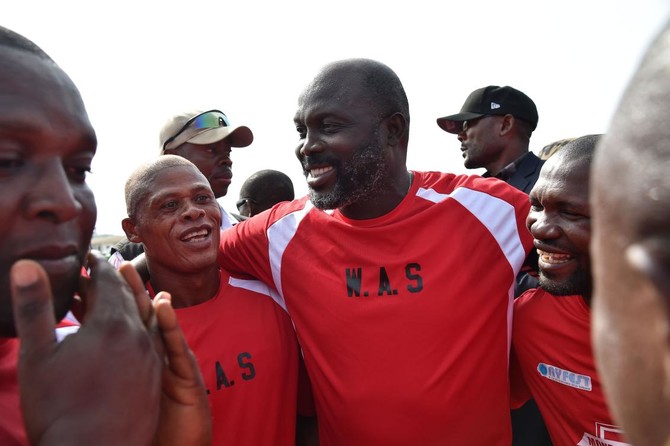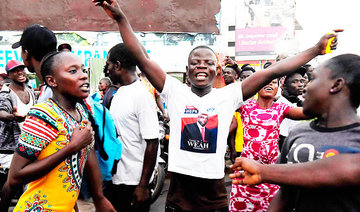MONROVIA: Incoming Liberian president George Weah on Saturday sought to dispel accusations he is ill-prepared to take the reins of his fragile west African country, and said his priority would be maintaining peace.
Former international footballer Weah played a friendly match against the Liberian Armed Forces side, fronting his All Stars team of former national players and friends, two days before his inauguration.
Ahead of the game which his team won 2-1, aided by an early goal from the former AC Milan and Paris Saint-Germain striker, Weah told journalists that criticism of his political career was misplaced.
“You want to look at me as a former footballer but I am a human being, I strive to be excellent, and I can be successful,” said the senator for Montserrado, a county which includes the nation’s capital, Monrovia.
He said he had faced similar disbelief from his countrymen when he left Liberia in the late 1980s, but went on to play for a string of top-flight European teams before being crowned the world’s best player by FIFA in 1996.
“I told them that when I work hard I believe what I believe in and I showed I could persevere,” he said, sporting a red jersey and captain’s armband.
Critics including outgoing Vice President Joseph Boakai, who lost a presidential election last year to Weah, have zoomed in on the fact that he dropped out of high school to concentrate on football, and they say just over three years serving as a senator is not enough to learn how to govern.
Expectations are sky-high he will raise living standards in a nation that ranks near the bottom of international development rankings.
When asked by AFP about his first priorities once he is inaugurated on Monday, Weah said maintaining the peace enjoyed by Liberians for the last 12 years under outgoing president Ellen Johnson Sirleaf topped the list.
“Peace is the order of the day, to unite our people, and then we will start our programs,” he said, remaining vague on policies that are believed to include a focus on education and agriculture in a country where less than half of children finish school, according to UNICEF.
The handover represents Liberia’s first democratic transfer of power since 1944, and cements impressions Liberia has finally moved on from a war that killed around a quarter of a million people between 1989 and 2003.
“Every kid wanted to be like him,” reminisced Brig.-General Charles Johnson, Deputy Chief of Staff of the Liberian Armed Forces, who captained the opposing team.
“He’s already started to hear some of the challenges that we are experiencing, and we are hoping that... he will get the understanding and more support for the armed forces of Liberia,” he added, making reference to chronic underfunding of the country’s security forces.



























